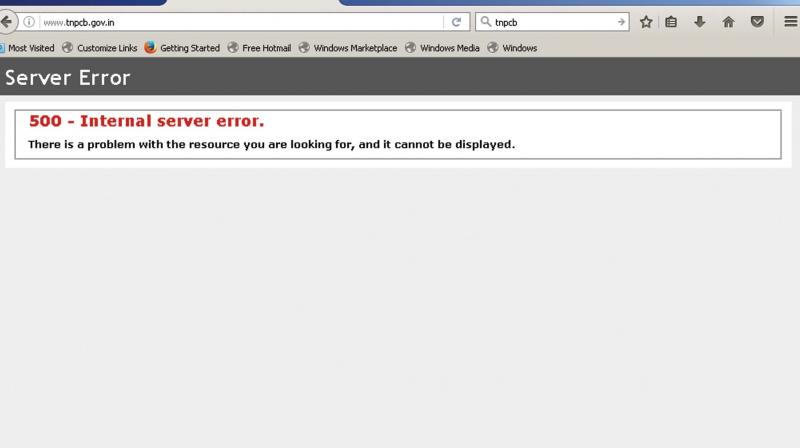TNPCB site not ready to give out Bhogi data

Chennai: Be prepared to be disappointed today, if you want to check the pollution levels in the neighbourhood after Bhogi, as the Tamil Nadu Pollution Control Board (TNPCB) website would remain down till Friday afternoon, due to internal server issues.
Environmentalists and journalists interested to check the city’s air quality were at shock with the delay in restoring the site, at crucial times like Bhogi. TNPCB does a 24-hour monitoring before and during Bhogi to analyse the pollution level in the city.
The State Pollution Control Board was already facing public ire, for not updating the PM 2.5 and PM10 levels regularly. A click on the site would display a message stating that the site cannot be opened due to an ‘Internal server error’
A senior official from TNPCB assured restoration by Friday evening as he said, “We had been experiencing server issues since two days. The site, maintained by the National Informatics Centre crashed on Wednesday and restoration work is on.”
Labelling the regulatory body as irrelevant, Environment activist, Nityanand Jayaraman said, “TNPCB does not serve as an efficient regulatory body. Despite the order from the state information commission requiring them to publish consent to operate, consent to the establishment and other vital details (as per section 4 of RTI act), the board doesn’t seem to take proper steps.”
It must be noted that the Pollution Control Board websites in other south Indian states are better off technologically, than Tamil Nadu. For example, Andhra Pradesh Pollution Control Board is so comprehensive, that one could know all vital details.
Awareness campaigns go on
Tamil Nadu Pollution Control Board has collaborated with educational institutions of the city to create awareness against burning of plastic and electronic waste, on account of Bhogi.
Pre-Bhogi samples have been collected from all the 15 stations in the city through manual monitoring method called Respirable Dust Sampler (RDS). A technician at the TNPCB office at Guindy said, “We are yet to analyse the samples of hazardous gases like sulphur dioxide and oxides of nitrogen. Data collected from the three offices - Ambattur, Arumbakkam and Guindy – will be analysed by today.”

